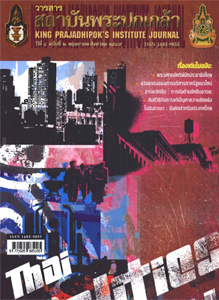Ethics of New Public Management
Main Article Content
Abstract
ปริมณฑลของกิจกรรมของรัฐบาลและการบริหารภาครัฐเข้าไปข้องเกี่ยวกับกรอบและพื้นฐานของศีลธรรมคุณธรรม (morality) และจริยธรรม (ethics) ของสังคมอย่างหลีกเลี่ยงไม่พ้น เนื่องจากการใช้อานาจรัฐของรัฐบาลและหน่วยงานในฐานะกลไกของรัฐตั้งอยู่บนข้อสมมุติพื้นฐานที่เกี่ยวโยงกับธรรมชาติของมนุษย์ สภาพความเป็นจริงของความสัมพันธ์ของมนุษย์ และค่านิยมที่มนุษย์ประดิษฐ์คิดค้นขึ้นมาและใช้เป็นฐานสาหรับการอ้างสิทธิความถูกต้องและความชอบธรรม ในการสร้างแบบแผนและวิธีการปฏิบัติของการปกครอง (governance) รวมถึงการใช้อานาจอิทธิพลของคนกลุ่มหนึ่งเหนือคนกลุ่มอื่นๆ ในสังคมมนุษย์ ศีลธรรมคุณธรรมและจริยธรรมจึงเป็นรากฐานสาคัญสาหรับการถกเถียงและการอภิปรายทั้งในด้านวิชาการทางรัฐศาสตร์และรัฐประศาสนศาสตร์ ซึ่งเกี่ยวข้องกับปฏิบัติการการใช้อานาจทางการเมืองว่าความชอบธรรมของการใช้อานาจทางสังคมและอานาจทางการเมืองในรูปแบบต่างๆ ควรเป็นอย่างไร
โดยเฉพาะในด้านการบริหารภาครัฐ ประวัติความเป็นมาของวิชาการและแนวปฏิบัติด้านการปกครอง (governance) และด้านรัฐประศาสนศาสตร์ (public administration) มักมีการถกเถียงและการสร้างข้อโต้แย้งจากกลุ่มต่างๆ ที่มีจุดยืนทางปรัชญาความคิดมุมมองและหลักการพื้นฐานเกี่ยวกับกรอบ จริยธรรมที่แตกต่างกัน ซึ่งครอบคลุมตั้งแต่ด้าน 1) สิ่งแวดล้อมเชิงจริยธรรม วัฒนธรรม และชุมชน 2) กลยุทธ์และการบริหารจริยธรรม 3) จริยธรรมและผลการปฏิบัติงานขององค์การ 4) จริยธรรมด้านกฎหมายและหน่วยงานการจัดระเบียบสังคม (regulatory agencies) 5) จริยธรรมเกี่ยวข้องกับการตัดสินใจและการพัฒนาด้านคุณธรรม
Article Details
@ 2020 King Prajadhipok's Institute The Government Complex Commemorating All Right Reserved.
References
Adams, B.G. and Balfour, D.L. 2005. “ Public Service Ethics and Administrative Evil: Prospects and Problems,” in Federickson and Ghere, eds. Ethics in Public Management. Pp. 114-138.
Bellamy, R. 2000. Rethinking Liberalism. London: Pinter. Ch. 7.
Carroll, J. and D.B. Lynn. 1996. “ The Future of Federal Reinvention: Congressional Perspective.” Public Administration Review 56, 3: 299-304.
Denhardt, J.V. and R.B. Denhardt. 2003. The New Public Service. Armonk. NY: M.E. Sharpe.
Drysak, J. 2000. Deliberative Democracy and Beyond. Oxford: Oxford University Press.
Fox, C. and Hugh, M. 1995. Postmodern Public Administration. Thousand Oaks, CA: Sage.
Frederickson, G.H. 1996. “ Comparing the Reinventing Government Movement With New Public Administration.” Public Administration Review 56,3: 263-69
Gardner, J. 1991. Building Community. Washington, DC: Independent Sector.
Honer, S.M., T.C. Hunt and D.L. Okholm. 2003. Invitation to Philosophy: Issues and Options (9 ed.) Belmont, CA.: Wadworth.
King, C.S. and C. Stivers. 1998. Government Is Us: Public Administration in an Anti-Government Era. Thousand Oaks, CA: Sage.
Mansbridge, J. 1994. “ Public Spirit in Political Systems.” In H.J. Aaron, ed. Values and Public Policy. Washington, DC: Brookings Institute.
McCabe, B. and J. Vinzant. 1999. “Governance Lessons: The Case of Charter School.” Administration and Society 31, 3: 361-77.
Menzel, D.C.( 2005) “ State of the Atr of Empirical Research on Ethics and Integrity in Governance ” in Frederickson, J.H. and Ghere, R.K. eds. Ethics in Public Management. New York: M.E. Sharpe.
Osborne, D. and T. Gaebler. 1992. Reinventing Government: How the Entrepreneurial Spirit Is Transforming the Public Sector. Reading, MA: Addison-Wesley.
Peters, G. B. and D. Savoie. 1966. “ Managing Incoherence: The Coordination and Empowerment Conundrum.” Public Administration Review 50, 3: 367-73.
Putnum, R. 2000. Bowling Alone. New York: Simon and Schuster.
Scott, J.A., G.B. Adams and B. Wechsler. 2004. “ Deliberative Governance: Lessons from Theory and Practice.” In P. Bogason.,ed. Tempering with Tradition. Lanham, MD: Lexignton Books.
Stivers, C. 1993. “ Citizenship Ethics in Public Administration.” In T.L. Cooper, ed. Handbook of Administrative Ethics. N.Y. : Marcel Dekker.
Thompson, D.F. 1985. “ The Possibility of Administrative Ethics.” Public Administration Review 45: 555-61.
Shklar, J.N. 1984. Ordinary Vices. Cambridge, MA: Harvardf University Press.


